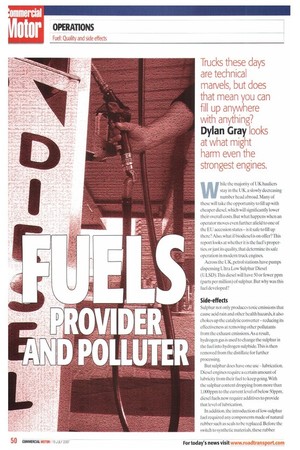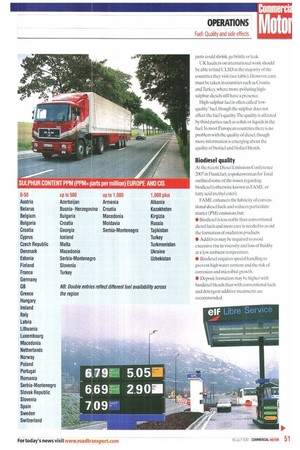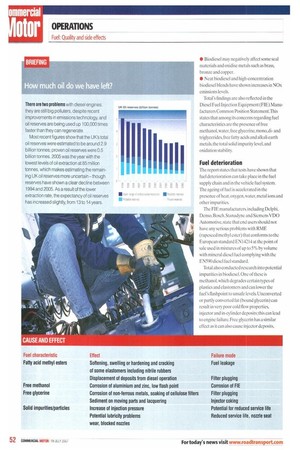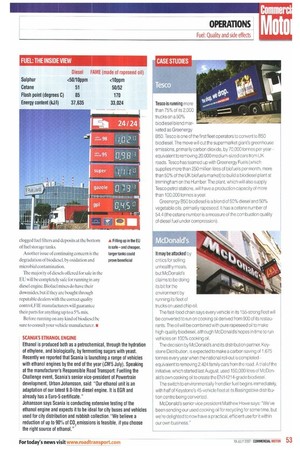TrucKs these days are technical marvels, but does that mean you can fill up anywhere with anything?
Page 50

Page 51

Page 52

Page 53

If you've noticed an error in this article please click here to report it so we can fix it.
Dylan Gray looks at what might harm even the strongest engines.
While the majority of UK hauliers stay in the UK, a slowly decreasing number head abroad. Many of these will take the opportunity to fill up with cheaper diesel, which will significantly lower their overall costs But what happens when an operator moves even further afield to one of the EU accession states—is it safe to fill up there? Also, what if biodiesel is on offer? This report looks at whether it is the fuel's properties, orj ust its quality, that determine its safe operation in modern truck engines.
Across the UK, petrol stations have pumps dispensing Ultra Low Sulphur Diesel (ULSD).This diesel will have 50 or fewer ppm (parts per million) of sulphur. But why was this fuel developed?
Side-effects
Sulphur not only produces toxic emissions that cause acid rain and other health hazards, it also chokes up the catalytic converter — reducing its effectiveness at removing other pollutants from the exhaust emissions.As a result, hydrogen gas is used to change the sulphur in the fuel into hydrogen sulphide.This is then removed from the distillate for further processing.
But sulphur does have one use —lubrication. Diesel engines require a certain amount of lubricity from their fuel to keep going. With the sulphur content dropping from more than 1,000ppm to the current level of below 50ppm, diesel fuels now require additives to provide that level of lubrication.
In addition, the introduction of low-sulphur fuel required any components made of natural rubber such as seals to be replaced. Before the switch to synthetic materials, these rubber parts could shrink, go brit de or leak.
UK hauliers on international work should be able to find ULSD in the majority of the countries they visit (see table). However care must be taken in countries such as Croatia and Turkey, where more-polluting highsulphur diesels still have a presence.
High-sulphur fuel is often called 'lowquality' fuel, though the sulphur does not affect the fuel's quality.The quality is affected by third parties such as solids or liquids in the fuel. In most European countries there is no problem with the quality of diesel, though more information is emerging about the quality of biofuel and biofuel blends.
Biodiesel quality
At the recent Diesel Emissions Conference 2007 in Frankfurt, a spokeswoman for Total outlined some of the issues regarding biodiesel (otherwise known as FAME, or fatty acid methyl ester).
FAME enhances the lubricity of conventional diesel fuels and reduces particulate matter (PM) emissions but: • Biodiesel is less stable than conventional diesel fuels and more care is needed to avoid the formation of oxidation products.
• Additives may be required to avoid excessive rise in viscosity and loss of fluidity at a low ambient temperature.
• Biodiesel requires special handling to prevent high water content and the risk of corrosion and microbial growth.
• Deposit formation may be higher with biodiesel blends than with conventional fuels and detergent additive treatments arc recommended. • Biodiesel may negatively affect some seal materials and oxidise metals such as brass, bronze and copper.
• Neat biodiesel and high-concentration biodiesel blends have shown increases in NOx emissions levels.
Total's findings are also reflected in the Diesel Fuel Injection Equipment (FIE) Manufacturers Common Position Statement.This states that among its concerns regarding fuel characteristics are the presence of free methanol, water, free glycerine, mono, diand triglycerides, free fatty acids and alkali earth metals, the total solid impurity level, and oxidation stability.
Fuel deterioration The report states that tests have shown that fuel deterioration can take place in the fuel supply chain and in the vehicle fuel system. The ageing of fuel is accelerated in the presence of heat, oxygen, water, metal ions and other impurities.
The FIE manufacturers, including Delphi, Denso,Bosch,Stanadyne and Siemens VDO Automotive, state that end users should not have any serious problems with RME (rapeseed methyl ester) that conforms to the European standard ENI4214aL the point of sale used in mixtures of up to 5% by volume with mineral diesel fuel complying with the EN590 diesel fuel standard.
Total also conducted research into potential impurities in biodiesel. One of these is methanol, which degrades certain types of plastics and elastomers and can lower the fuel's flashpoint to unsafe levels. Unconverted or partly converted fat (bound glycerin) can result in very poor cold flow properties, injector and in-cylinder deposits; this can lead to engine failure. Free glycerin has a similar effect as it can also cause injector deposits. clogged fuel filters and deposits at the bottom A Filling up in the EU of fuel storage tanks. is safe — and cheaper, Another issue of continuing concern is the larger tanks could degradation of biodiesel. by oxidation and prove beneficial microbial contamination.
The majority of diesels offered for sale in the EU will be completely safe for running in any diesel engine. Biofuel mixes do have their downsides, but if they are bought through reputable dealers with the correct quality control, FIE manufacturers will guarantee their parts for anything up to a 5% mix.
Before running on any kind of biodiesel be sure to consult your vehicle manufacturer. •


























































































































































































